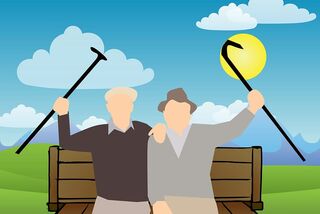Self-Esteem
Why Are Older People Happier But Less Confident?
What could explain this seeming contradiction? The shocking answer may be this.
Posted July 5, 2020 Reviewed by Devon Frye

Research on the relationship between happiness and aging is solid and deep, with all studies pointing to the same conclusion: Older people are happier people, even when they are coping with problems of declining health and relationship loss.
Still, there is a disturbing note. A large 2010 study published by the American Psychological Association examined the self-esteem of 3,617 Americans ages 25 to 104 every four years for sixteen years. The conclusion of the researchers was that self-esteem rose steadily until retirement, or about age 60-65, then declined steadily after that.
I was shocked when I came across this study. I could hardly believe it. Wasn’t self-esteem the first cousin of happiness? Could you really have one without the other? I was especially bewildered because my own self-esteem, happiness, and age have all risen together. I read further to make sure I understood. Yes, according to the research, self-esteem—the feeling of one’s overall worth as a person—did decline later in life.
Offering a shred of optimism, the authors put forth two factors that seemed to staunch the ebb tide of declining self-esteem: “wealth” and/or “health.” They speculated that wealth and health might be linked to a greater sense of independence which, in turn, would bolster self-esteem. Or wealth and health might enable an individual to make greater contributions to one’s family and society, an action that could also shore up self-esteem. I found these theories disturbing. Could someone really buy their way to self-esteem?
Other studies challenge the idea that there is a steep decline in self-esteem as people age. For example, a study of 462 people, aged 70-103, found that the amount of the decline was minor and occurred chiefly among the oldest-old and those close to death. Self-esteem remained relatively stable in late life, according to this study from 2015. This group of researchers found that four factors helped buttress self-esteem among the elderly: health, cognitive ability, a sense of control, and social inclusion.
Wealth, health, faith in one’s cognitive abilities, a sense of control, and relationships—it makes sense that these factors might play a role in maintaining the self-esteem of older people.
The Real Culprit?
However, I suspect that another factor might be a key contributor to the lack of self-esteem among older people: ageism. By "ageism,"* I mean both the belief that older people are less important simply because of their age and the widespread discriminatory practices that result from this belief.
Many, if not most, older people themselves have no doubt internalized the ageism of our culture (I am no exception). This internalized ageism cannot help but affect feelings of self-worth. The sense of being “less than” younger or middle-aged people poses a danger to the confidence of any older person, regardless of skills, health, or wealth.
There is fascinating research showing the harmful effects of age stereotyping. In one study, Yale researcher Becca Levy flashed words positively or negatively associated with aging on a screen where they were “seen” only subliminally by older research subjects. “The experiments demonstrated that older people exposed to positive messages about late life showed better recall and more confidence in their abilities than those exposed to negative ones,” summarizes Ashton Applewhite, author of This Chair Rocks: A Manifesto Against Ageism. (Similar experiments show the effects of “stereotype threats” on Blacks, women, and other stigmatized groups.)
What Does Ageism Look Like?
Here are just a few ways in which ageism might affect the self-esteem of older people:
- Employment discrimination. Job discrimination affects both wealth and self-sufficiency. “How are older people supposed to remain self-sufficient if they’re forced out of the job market?” asks Applewhite.
- Stereotyping. Older people are characterized as “geezers,” “crones,” “senile,” and worse. These stereotypes reinforce shame and self-loathing. “Shame can damage self-esteem and quality of life as much as externally imposed stereotyping,” according to Applewhite.
- Disability discrimination. People with disabilities are stigmatized in our society; aging adults whose bodies are failing and must use canes, walkers, and wheelchairs become subject to this set of prejudices in addition to common aging biases.
- Dependence discrimination. Older people often can benefit from help from their children, nursing aides, or spouse. But in our society, it is hard to ask for help because “needing help” is not part of the John Wayne/total self-reliance ethos. However, the lives of olders can narrow significantly if they don’t find a way to fight this bias and accept the need for assistance with dignity and creativity.
- Judgment about appearance. “Looking old” is considered a betrayal of our cultural standards of beauty. Women are judged even more harshly than men for the terrible crime of aging. By the way, I am not judging anyone who tries to look younger either. Who could blame anyone for trying to escape society's biased opinions? And some people need to maintain a youthful appearance to keep their job.
What You Can Do
If you are getting older—and you are—and you find yourself feeling “less than” others or even your younger self, begin asking why. It could be systemic ageism, internalized ageism, or a combination of the two.
To make life better for yourself and everyone else, you may want to become an anti-ageism activist. A few potential issues to address: fix the problem of poor compensation and benefits for caregivers of the elderly, campaign against job discrimination, advocate for universal design and other workplace accommodations, lobby Medicare to add long-term care and hearing aids benefits, support the expansion of Social Security, work towards absentee voting… and the list could go on.
On the personal level, awareness of internalized ageism can help you see the world and yourself with new eyes. At the very least, you can train yourself to pause and self-correct when you start to feel less deserving of your own respect. You can replace self-stereotyping with the determination to love yourself, respect yourself, and express yourself. Appreciating and valuing who you are is a cornerstone of happiness at any age.
If older people themselves can become less ageist, then it is my hopeful guess that future studies about aging and confidence might show a distinct rise in self-esteem among the over-65 group.
© Meg Selig, 2020. All rights reserved. For permissions, click here.
*The formal definition of ageism, according to Ashton Applewhite, is: "discrimination and stereotyping on the basis of a person's age."
Facebook image: fizkes/Shutterstock
References
Applewhite, A. This Chair Rocks: A Manifesto Against Ageism (2016). NY: Celadon Books.
“Self-esteem Declines Sharply Among Older Adults While Middle-Aged Are Most Confident,” APA, 2010: https://www.apa.org/news/press/releases/2010/04/self-esteem Original article: Orth, U. et al, “Self-Esteem Development From Young Adulthood to Old Age: A Cohort-Sequential Longitudinal Study,” Journal of Personality and Social Psychology, 2010, Vol. 98, No. 4, 645– 658.
“Self-Esteem is Relatively Stable Late in Life: The Role of Resources in the Health, Self-Regulation, and Social Domains,” Wagner, J. et al. Developmental Psychology. 2015 Jan; 51(1): 136–149. https://www.ncbi.nlm.nih.gov/pmc/articles/PMC4397980/
Wykle, M.L. et al, eds. Successful Aging Through the Life Span (2005). NY: Springer Publishing Co, 108, 153.




